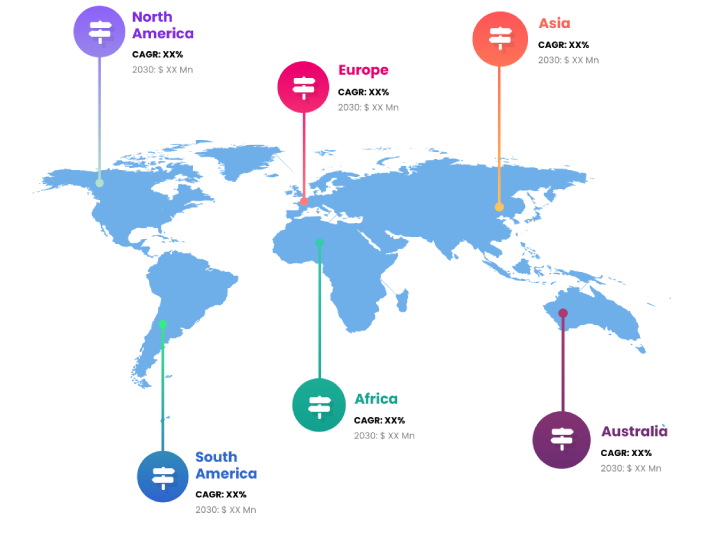
Smart speakers have become increasingly popular as the number of "smart homes" has increased rapidly in recent years. They can connect to Wi-Fi and have voice-activated communication features. They are the brains behind the smart home's network of gadgets. Rising home speaker system adoption rates point to a bright future for the market. The widespread acceptance of smart home products, the development of artificial technology, and the proliferation of display-based devices are all factors that are expected to offer market opportunities for key players. The most successful companies in this field are also emphasising expansion into new foreign markets.
The global smart speaker market is poised to rise significantly in the coming year, propelled by rising adoption of digital technology and the IoT in numerous regions. The market for AI-powered virtual assistants like Alexa is expected to grow at a rapid clip in the coming years. Since Alexa was the first smart speaker available, it naturally has a leg up on the competition. Most modern voice-interactive devices, or "smart speakers," are wireless and make use of Wi-Fi, Bluetooth, or some other wireless protocol. Voice commands are used for a wide variety of tasks, from the most basic ones like playing music or podcasts and setting timers to the more complex ones like online shopping, checking the weather, ordering food, listening to music, and reading the latest news.
The constant need for simple and comfortable living among homeowners has sped up the development of linked solutions for smart homes. There has been an increasing number of "smart" products introduced to the market since 2012. The ability to control one's house from virtually anywhere using only an internet connection and a mobile phone is a major selling point for smart home equipment. The development of smart home devices can be traced back to three main factors: advancements in IoT technology; increased customer interest in security, safety, and convenience; and rising consumer interest in products and solutions that minimise energy usage. Thanks to smart speakers, consumers can control their smart home devices from afar just by using their voice. Smart speakers have quickly surpassed all other similar devices as the most popularly adopted smart home hub. The smart home hub streamlines common activities such as lighting control, music playback, and web browsing. The wireless interoperability with mobile devices would be greatly appreciated by its users. Moreover, smart speakers are much more space-efficient than traditional home theatre. Smart speakers are quickly replacing traditional speakers because of these advantages in both developed and developing countries. The proliferation of smart home devices is expected to drive significant rise in the demand for smart speakers that include integrated virtual assistants over the next few years.
The biggest obstacle preventing this sector from expanding is issues with connectivity and mobile applications. A smart speaker can only perform its intended tasks if it can connect to the internet. A constant internet connection is required for users of smart speakers to issue app commands. A smart speaker can be connected to a wide range of sensors and other devices. If the sensors can't communicate with one another, then the app can't communicate with the smart speaker. In order for the smart speaker to communicate with other smart devices, it must be placed in close proximity to the router.
Consumer spending on portable, user-friendly, and technologically advanced smart devices has increased, signalling a sea change in how people seek to integrate technology into their daily lives. Additionally, several speaker manufacturers have integrated voice assistance into speakers due to consumer desire for multipurpose, rapid, varied, and trustworthy solutions. The convenience and accessibility of connected products and services have contributed to their rapid adoption by the general public. Smart speakers have made it easier for people to connect to the internet and have real-time conversations while on the go without sacrificing privacy or security.
The ability to use a voice assistant The use of smart speakers in connected homes where users' private information is also stored is on the rise. Unintentional activation of smart speakers via voice commands contained on websites or TV advertising is a serious worry for smart speaker users. Most smart speakers may also connect to any local network and any device on the same network, allowing for unauthorised adjustments to be made to the smart speaker's settings or even a complete factory reset. To counteract these dangers, a safe home network and a robust password are necessities. Connected to other smart devices such as smartphones, smart locks, TVs, and radios, smart speakers can be used by multiple people at once. When someone else needs help placing an online order, they can use a smart speaker that supports voice purchases. One-click ordering is also made possible via Amazon Prime when a smart speaker is connected to an account. Users must therefore lock down their preferences and keep an eye on their alerts.
Report Coverage
Global Smart Speaker research report categorizes the market for global based on various segments and regions, forecasts revenue growth, and analyzes trends in each submarket. Global Smart Speaker report analyses the key growth drivers, opportunities, and challenges influencing the global market. Recent market developments and Smart Speaker competitive strategies such as expansion, product launch and development, partnership, merger, and acquisition have been included to draw the competitive landscape in the market. The report strategically identifies and profiles the key Smart Speaker market players and analyses their core competencies in each global market sub-segments.
| REPORT ATTRIBUTES | DETAILS |
|---|---|
| Study Period | 2017-2030 |
| Base Year | 2022 |
| Forecast Period | 2022-2030 |
| Historical Period | 2017-2021 |
| Unit | Value (USD Billion) |
| Key Companies Profiled | Amazon, Inc (Amazon) (US), Harman International (US), Apple Inc. (Apple) (US), Sonos (US), Alphabet Inc (Alphabet) (US), Baidu, Inc (Baidu) (China), Bose Corporation (Bose) (US), Sony Corporation (Sony) (Japan), Onkyo Corporation (Onkyo) (Japan), Samsung Electronics (Samsung) (South Korea), Panasonic Corporation (Panasonic) (Japan), Alibaba Group (Alibaba) (China), Altec Lansing (US), Lenovo Group Ltd. (Lenovo) (China), Xiaomi Inc. (Xiaomi) (China), SK Telecom Co., Ltd. (SK Telecom) (South Korea), Facebook (US), and LG Electronics (South Korea) |
| Segments Covered | • By Product |
| Customization Scope | Free report customization (equivalent to up to 3 analyst working days) with purchase. Addition or alteration to country, regional & segment scope |
Key Points Covered in the Report
- Market Revenue of Smart Speaker Market from 2021 to 2030.
- Market Forecast for Smart Speaker Market from 2021 to 2030.
- Regional Market Share and Revenue from 2021 to 2030.
- Country Market share within region from 2021 to 2030.
- Key Type and Application Revenue and forecast.
- Company Market Share Analysis, Smart Speaker competitive scenario, ranking, and detailed company
profiles. - Market driver, restraints, and detailed COVID-19 impact on Smart Speaker
Market
Competitive Environment:
The research provides an accurate study of the major organisations and companies operating in the global Smart Speaker market, along with a comparative evaluation based on their product portfolios, corporate summaries, geographic reach, business plans, Smart Speaker market shares in specific segments, and SWOT analyses. A detailed analysis of the firms' recent news and developments, such as product development, inventions, joint ventures, partnerships, mergers and acquisitions, strategic alliances, and other activities, is also included in the study. This makes it possible to assess the level of market competition as a whole.
List of Major Market Participants
Amazon, Inc (Amazon) (US), Harman International (US), Apple Inc. (Apple) (US), Sonos (US), Alphabet Inc (Alphabet) (US), Baidu, Inc (Baidu) (China), Bose Corporation (Bose) (US), Sony Corporation (Sony) (Japan), Onkyo Corporation (Onkyo) (Japan), Samsung Electronics (Samsung) (South Korea), Panasonic Corporation (Panasonic) (Japan), Alibaba Group (Alibaba) (China), Altec Lansing (US), Lenovo Group Ltd. (Lenovo) (China), Xiaomi Inc. (Xiaomi) (China), SK Telecom Co., Ltd. (SK Telecom) (South Korea), Facebook (US), and LG Electronics (South Korea)
Primary Target Market
- Market Players of Smart Speaker
- Investors
- End-users
- Government Authorities
- Consulting And Research Firm
- Venture capitalists
- Third-party knowledge providers
- Value-Added Resellers (VARs)
Market Segment:
This study forecasts global, regional, and country revenue from 2019 to 2030. INFINITIVE DATA EXPERT has segmented the global Smart Speaker market based on the below-mentioned segments:
Global Smart Speaker Market, By Component
Hardware
Software
Global Smart Speaker market, By Application
Smart Home
Consumer
Smart Office
Others
Global Smart Speaker market, Regional Analysis
- Europe: Germany, Uk, France, Italy, Spain, Russia, Rest of Europe
- The Asia Pacific: China,Japan,India,South Korea,Australia,Rest of Asia Pacific
- South America: Brazil, Argentina, Rest of South America
- Middle East & Africa: UAE, Saudi Arabia, Qatar, South Africa, Rest of Middle East & Africa
You will get in-depth and extensive smart speaker market market research and competitor analysis for your business to help you develop more profound insights into the smart speaker market Market.
Through INFINITIVE Data Expert is a professional Market Research services, I will identify the smart speaker market market size, demand & opportunities, growth rate, and target audience with a comprehensive analysis of your competitors.



